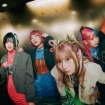It was call time in Sydney, Australia. HANABIE.'s Yukina — who was almost 5,000 miles away from her Tokyo home — looked out into the crowd of thousands from the side of the stage, a seemingly endless sea of faces that appeared to merge into one. Limp Bizkit's Fred Durst shouted her name, "YUKINA!" out into that vast swarm while Wes Borland played the instantly recognizable riff from the band's 1999 nu-metal anthem "Break Stuff." Yukina, outfitted in neon pink and green, pogoed out onto the stage to join the headliners, shouting: "I think you better quit lettin' shit slip/Or you'll be leavin' with a fat lip" alongside Durst into a crowd bigger than any she'd ever seen.
"It was a huge turning point for me," says Yukina, via a Japanese translator, who's also joined on the Zoom call by her bandmate and guitarist Matsuri. Almost 10 years before that heart-in-throat moment, they formed HANABIE. with friends at school. Yukina, the lead singer and screamer, says they had dizzying dreams of be-coming "synonymous with the idea of a Japanese girl band."
HANABIE. wanted to conquer their country. But then, almost a decade later, they found themselves supporting Limp Bizkit. Sharing the stage with the nu-metal mainstays — who rank among the globe's biggest legacy rock acts — forced them to shift the size of their ambitions. Now it was time for HANABIE. to take over the world.
HANABIE. blend elements of metalcore, groove metal, hyperpop and vocaloid into a musical style they call Harajuku-core, which borrows its name from Tokyo's colorful youth culture and fashion district (ground zero for the impeccably dressed gothic, cosplay, punk, biker and kawaii tribes). Through their music, HANABIE. are loudly and proudly bringing otaku — Japanese pop culture, particularly the passion for anime, manga and video games — to an international audience. They're quickly becoming one of the hottest topics in metal, and winning fans in every country while touring with icons including Bizkit, Slash and Bring Me the Horizon. Online, highly active fan pages, Reddits and Discord servers are dedicated to them.
Their hyperkinetic music videos now routinely reach millions of views on YouTube, inspiring extra-zealous comments from mostly English speakers. Last year, that frenzied fan activity helped prompt Sony's Epic Records to sign them and release their second studio album Reborn Superstar! To say this was all an unexpected turn of events is an understatement. Now, they no longer want to just be the first band that comes to mind when you hear "Japanese girl group." They want to be the best band you think of when you hear "rock."
They're well aware that the first step in achieving that goal is to step outside of BABYMETAL's shadow. But while there's no doubt that BABYMETAL's pioneering blend of kawaii and metal cultures helped open the gate for Japanese girl groups with a hard-rock edge, the comparisons between BABYMETAL and HANABIE. end at their gender and genre.
As guitarist, Matsuri has a thicker post-grunge guitar tone compared to the classic power-chord stylings of BABYMETAL. And Yukina's songwriting takes a uniquely sociological slant, as she covers everything from Japanese corporate culture ("Pardon Me, I Have to Go Now") to nuanced meditations on the tantalizing yet addictive nature of cyberspace ("OTAKU Lovely Densetsu"). HANABIE.'s music is a self-reflexive commentary on Japanese culture itself — in particular, celebrating "being otaku" — as they at-tempt to reclaim and redefine it for themselves, as well as export it globally.
While half of the band, which also includes bassist Hettsu and drummer Chika, were raised only on Japanese music and culture, Yukina and Matsuri's upbringing was Western-influenced. They watched The Powerpuff Girls and various other American cartoons each Sunday morning. In anime they saw Japanese and American culture comingling, and recognized the coordinated impact they had on one an-other. Sailor Moon and Evangelion, Matsuri says, were also an enormous part of her formative years.
Yukina was exposed to metal from an early age, courtesy of her dad's record collection. She remembers hearing the death-metal growls rumbling from his stereo speakers as a child. "I was like, 'What?!' it was a little bit scary, actually," she says. Her fears were tempered with age and transformed into curiosity when, as a young teen, she discovered Maximum the Hormone, a Japanese hardcore punk band whose chaotic soundscapes and irreverent worldview are still massively influential to HANABIE. "[They] opened my ears up to band music in general," says Yukina.

At school, Yukina, Matsuri and Hettsu began covering Maximum the Hormone's songs during music classes at their all-girls junior school. While Matsuri and Hettsu learned to play their respective instruments via Maximum the Hormone tabs, Yukina acquired her mesmeric stage presence by practicing in front of small audiences at karaoke nights each weekend. The girls transitioned from Maximum the Hormone covers to original material soon after. To mark the change, they formed HANABIE. during their first year of high school, naming the band after the respective seasons in which they were born: Yukina's birthday is in the spring, hence, "hana," which means "flower" in Japanese; her bandmates were born in the winter months, thus, "bie," which means "cold."
As HANABIE., they self-produced and released their first singles "Crash Over" and "Sweet Killer" in 2016 and began performing at clubs around the city in their sophomore year, promoting shows with HANABIE.-dedicated social media accounts, and stretching their tentacles out to audiences beyond Tokyo. Social media, says Yukina, has both shifted otaku culture and brought it to a larger international audience. Matsuri, the gamer of the group and hardcore player of first-person shooter Overwatch, adds, "You get the sense that otaku used to be looked down upon, but social media has broken boundaries, to the point where we can feel proud of otaku culture like games and anime. The notion of 'otaku' has changed in a very good way."
The reclamation of otaku is largely why HANABIE. will keep writing their lyrics in Japanese. "Sometimes, I've felt tempted to write in English," says Yukina, "but then we toured abroad, and were so happy when we saw foreign fans singing our Japanese lyrics back to us."
HANABIE. performed abroad for the first time in 2023, playing a slew of highly buzzed-about shows across Europe and the U.S., including Louder Than Life and Aftershock. "We were seizing the moment, grabbing every opportunity, making the most out of everyday," says Yukina. "It changed everything when we saw how our crowds had worked to learn our Japanese lyrics. It really touched us," she says. "Even though it's a different language, everyone feels the same emotion together."
HANABIE.'s mission to bring their sound and otaku culture to the world continues this spring with more touring runs across North America and the EU. It's a journey they don't see stopping anytime soon. In fact, as far as they're concerned, HANABIE. are simply powering up for their next major breakthrough.
"2024 will be all about laying the groundwork for bigger things," Yukina continues. "We'll be updating and upgrading." Matsuri chimes in: "First it was the world, now it's the universe."












